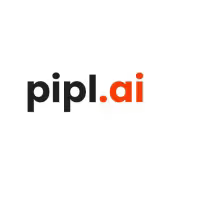Chili Piper Alternatives
Find your Chili Piper replacement. This guide compares 10 alternatives on features, price, and use cases to help you choose the right tool.
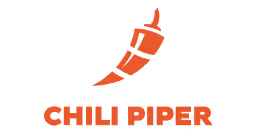
Chili Piper is a popular tool for a reason. It’s a strong performer for scheduling and lead routing, especially for teams that value convenience and an easy setup. Many users choose it when they need to book meetings from their web forms quickly.
But no tool is perfect. Some users mention a learning curve or find it expensive. That's why we've analyzed the top alternatives, comparing them to Chili Piper based on G2 reviews to help you choose. Let's get started.
Meet 11x: A Digital Worker For Sales
For sales teams that need automation beyond appointment tools, digital workers are an option. 11x offers autonomous agents to manage sales tasks. See how these digital employees can support your revenue operations.
At 11x, we provide a GTM platform where AI agents manage the sales process. Our agent Alice finds prospects, handles outreach on email and LinkedIn, and updates your CRM.
A second agent, Julian, qualifies inbound leads and books meetings. Our platform replaces separate tools for data enrichment, outreach, and email warmup by unifying these functions.
Chili Piper Alternatives
This section provides a detailed breakdown of leading Chili Piper alternatives. We analyze each option based on its pricing, core features, and its pros and cons relative to Chili Piper.
1) Calendly

Calendly is an automation platform for schedules that replaces email exchanges to book appointments. Users share availability through personalized links or embedded widgets, which reflect real-time calendar data. The tool integrates with over 100 business applications and automates reminders.
It is used for sales lead qualification, client meetings, and internal team syncs. The platform serves individuals and teams, with options for enterprise-level security and administration.
Calendly's Main Features
- The platform connects with up to six calendars, including Google and Outlook, to show real-time availability.
- It sends automated SMS and email reminders and follow-ups to reduce manual work.
- Users create custom event types for various meetings, such as one-to-one, group, or round-robin sessions.
- The tool provides centralized administration for user management, security settings, and usage analytics.
How Calendly Compares To Chili Piper
Average Review score: 4.7/5 stars based on 2,399 G2 reviews.
- Calendly provides a free plan for basic scheduling, an option Chili Piper does not offer. This makes it accessible for individuals or users with simple needs.
- It is a general-purpose scheduling tool used across different departments like HR and customer success. Chili Piper, by comparison, is highly specialized for sales and marketing lead conversion.
- The platform's interface is often noted for its simplicity for standard appointment booking. Chili Piper's setup can be more complex due to its focus on intricate lead routing rules.
- This tool offers integrations with over 100 applications for broad business use. In contrast, Chili Piper's integrations are deep but center on CRMs and tools within the sales ecosystem.
Where Calendly Falls Short Compared To Chili Piper
- Calendly provides basic round-robin scheduling. It does not offer the advanced, rule-based routing found in Chili Piper, which can assign leads based on form data like company size or territory.
- The platform lacks a feature for qualifying and booking leads instantly from a web form. This is different from Chili Piper, which helps capture high-intent leads right after they submit their information.
- Some users find its CRM integration is less specialized for sales workflows. For example, it may not handle complex meeting handoffs between different sales roles as smoothly as Chili Piper does.
Pricing and Cost-Effectiveness
Calendly offers a free plan, which Chili Piper does not. Its paid plans start at $10 per seat for the Standard tier, while Chili Piper's entry-level products begin at $15 per user per month. For more advanced routing, Chili Piper's Handoff tool costs $30 per user, making Calendly more cost-effective for basic scheduling.
2) HubSpot Sales Hub
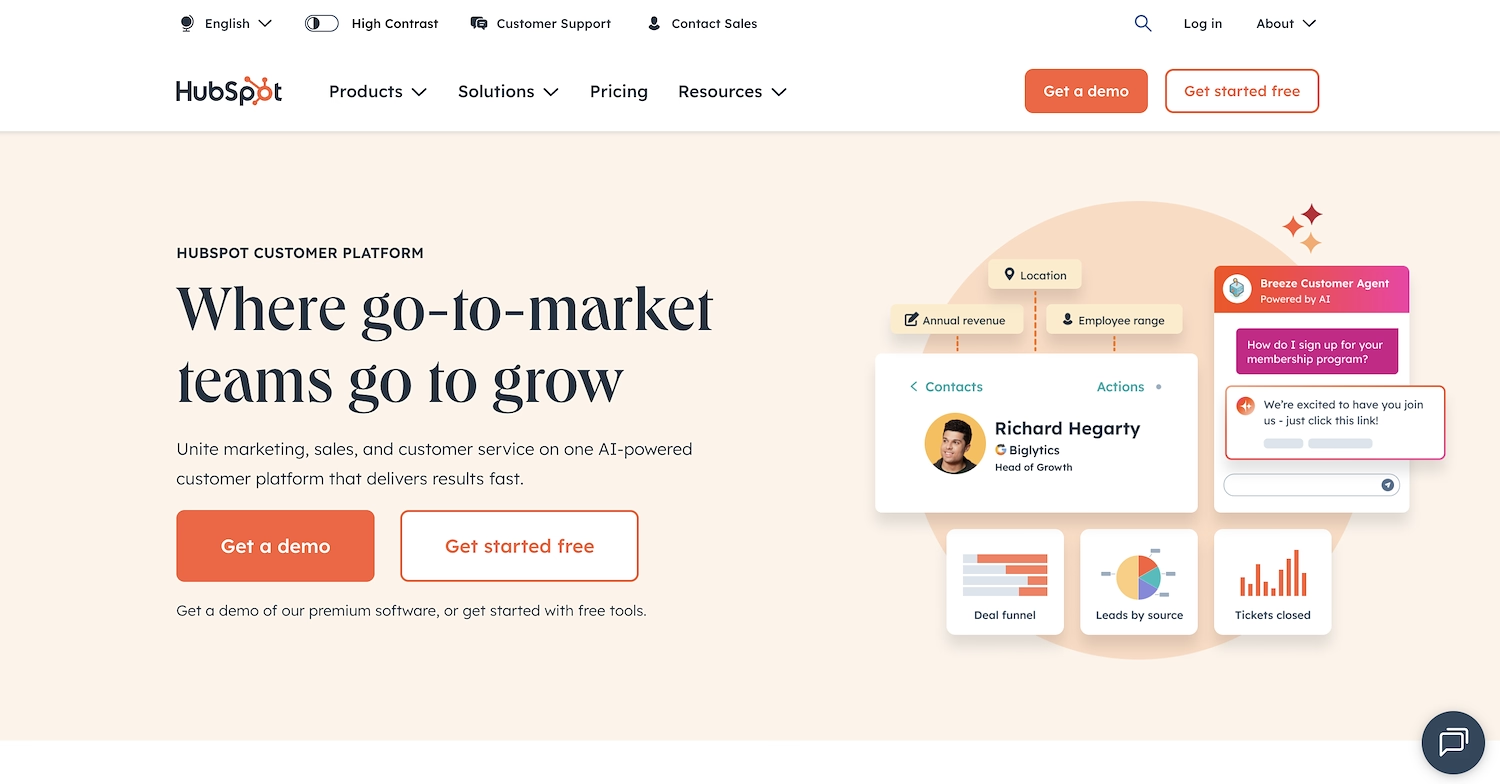
HubSpot Sales Hub is an AI-powered sales platform that unites tools for prospect outreach, deal management, and reports in a single workspace. It can run on its own Smart CRM or alongside an existing one and integrates with over 1,700 applications.
The software includes a meeting scheduler with automatic follow-up and uses AI agents for 24/7 prospect communication to accelerate decisions.
HubSpot Sales Hub's Main Features
- The platform uses AI agents for 24/7 prospect communication and autonomous lead research with personalized outreach.
- It provides tools for the entire deal journey, including visual pipelines, quote creation, e-signatures, and payment processing.
- The software offers sales analytics, conversation intelligence with call transcription, and AI-powered revenue forecasting.
- It includes a sales engagement dashboard with email templates, tracking, sequences, and call tracking with recording.
How HubSpot Sales Hub Compares To Chili Piper
Average Review score: 4.4/5 stars based on 12,407 G2 reviews.
- HubSpot Sales Hub is an all-in-one sales platform with a built-in CRM. This differs from Chili Piper, which focuses on appointment and lead routing functions that require a separate CRM.
- The tool includes features for the full sales cycle, like email campaigns and deal management. Chili Piper, in comparison, concentrates on the top-of-funnel appointment process.
- It uses AI agents for continuous prospect communication and lead research. This provides a different method for lead engagement than Chili Piper's form-based instant scheduler.
- HubSpot offers a free CRM as its foundation, which helps teams with low budgets. In contrast, Chili Piper has no free plan and operates as a paid layer on an existing CRM.
- The platform offers extensive sales analytics and revenue forecast tools. This gives a broader performance view compared to Chili Piper's metrics, which center on appointments and lead distribution.
Where HubSpot Sales Hub Falls Short
- The platform lacks a native instant scheduler for web forms. Unlike Chili Piper, which books meetings immediately upon form submission, HubSpot's process may introduce a delay. This sometimes results in a lower conversion rate for inbound leads.
- Its lead routing capabilities are less advanced compared to Chili Piper. The tool assigns leads, but it may lack the complex, real-time rules for territory or account ownership that Chili Piper's Handoff tool provides.
- As an all-in-one platform, some users find its scheduling tool is less specialized than Chili Piper. For teams with very specific inbound scheduling needs, a dedicated tool sometimes offers more focused features and deeper customization.
Pricing and Cost-Effectiveness
HubSpot Sales Hub offers a free CRM, with its paid Sales Hub Starter plan at $20 per seat monthly. Chili Piper is more modular, with its entry-level scheduler at $15 per user and advanced routing at $30, making it a more cost-effective choice for teams needing only those specific functions.
3) Drift
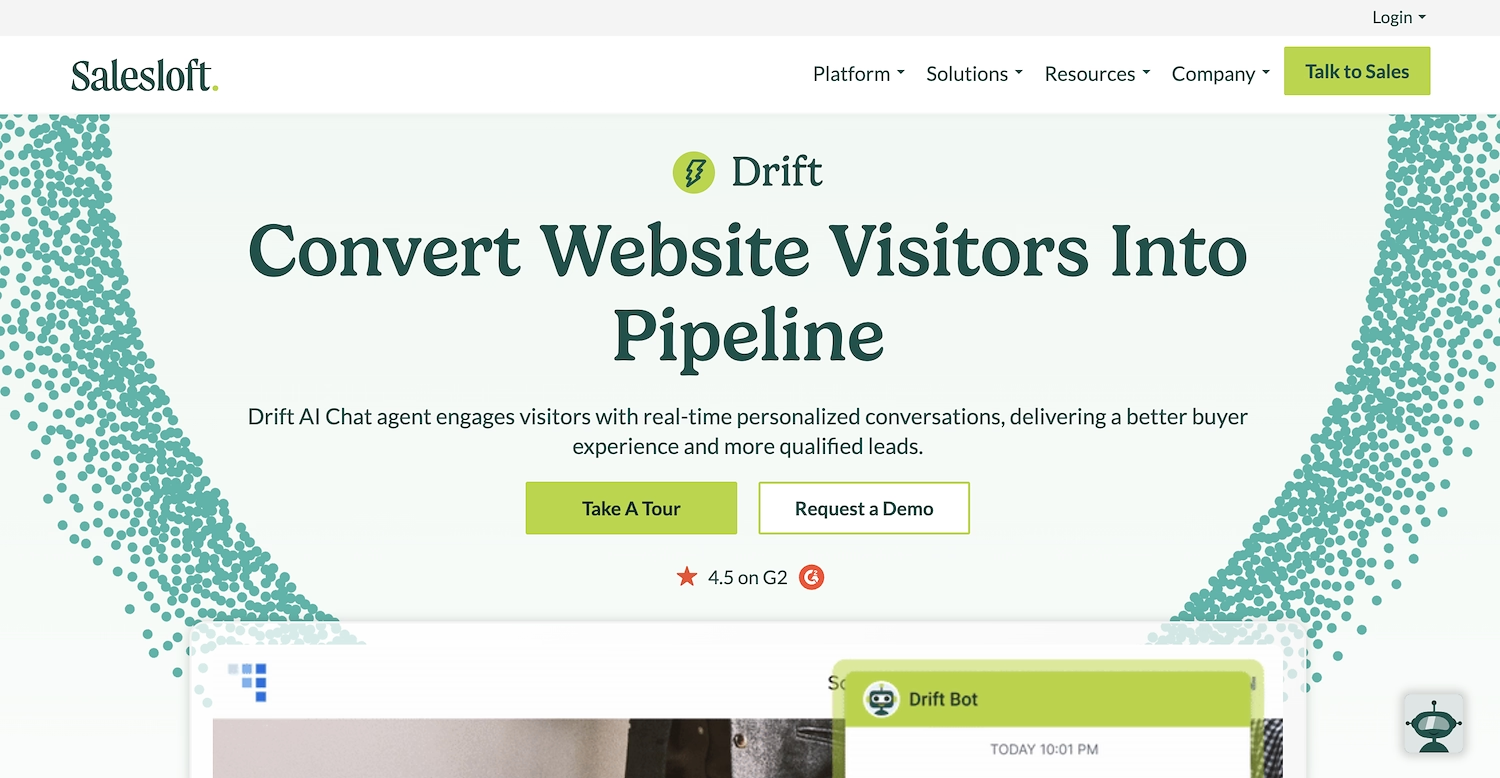
Drift is an AI chat solution that converts website traffic into a qualified pipeline. Its AI agent engages visitors in real-time conversations to answer questions, qualify leads, and book meetings. The platform routes high-intent buyers to the correct sales representatives.
This approach provides instant answers on a website and can accelerate sales through the direct connection of qualified leads to sales teams.
Drift's Main Features
- The platform uses AI chat agents that operate 24/7 to answer questions, qualify leads, and book meetings through natural-language conversations.
- It identifies anonymous website visitors and provides firmographic data like company and location to create tailored chat flows.
- A feature called Fastlane identifies high-value buyers from your tech stack data and allows them to bypass forms for an immediate connection.
- The tool facilitates a real-time handoff between bots and human agents to engage target accounts without requiring them to fill out forms.
How Drift Compares To Chili Piper
Average Review score: 4.4/5 stars based on 1,252 G2 reviews.
- Drift uses AI-powered chatbots to engage website visitors in real-time conversations. This is different from Chili Piper, which captures leads after they complete a web form.
- The tool qualifies leads through conversational questions and answers. In comparison, Chili Piper qualifies leads based on the data submitted in a form field, such as company size or role.
- It offers a feature called Fastlane that identifies high-intent buyers and connects them directly with sales, letting them skip forms. Chili Piper's process centers around the form to initiate scheduling.
- This platform can identify details about anonymous website visitors to personalize the chat experience. Chili Piper's personalization relies on the information a visitor provides in the form.
Where Drift Falls Short Compared To Chili Piper
- Drift focuses on lead capture through conversational chat. This approach sometimes misses prospects who prefer to book a meeting directly from a web form, a process that Chili Piper automates without requiring a live conversation.
- Its lead routing is primarily driven by chat conversations. Some users find it lacks the complex, rule-based routing of Chili Piper, which assigns leads based on specific form data like territory or company size.
- The platform represents a significant investment with high starting costs. This makes it less suitable for teams that only need a dedicated scheduling tool, where Chili Piper provides a more focused and cost-effective solution.
Pricing and Cost-Effectiveness
Drift's pricing starts at $2,500 per month for its Premium plan, a significant contrast to Chili Piper's modular, per-user plans that begin at $15. This makes Chili Piper a more cost-effective choice for teams that only need scheduling and routing tools, while Drift is a larger investment for a complete conversational platform.
4) Intercom
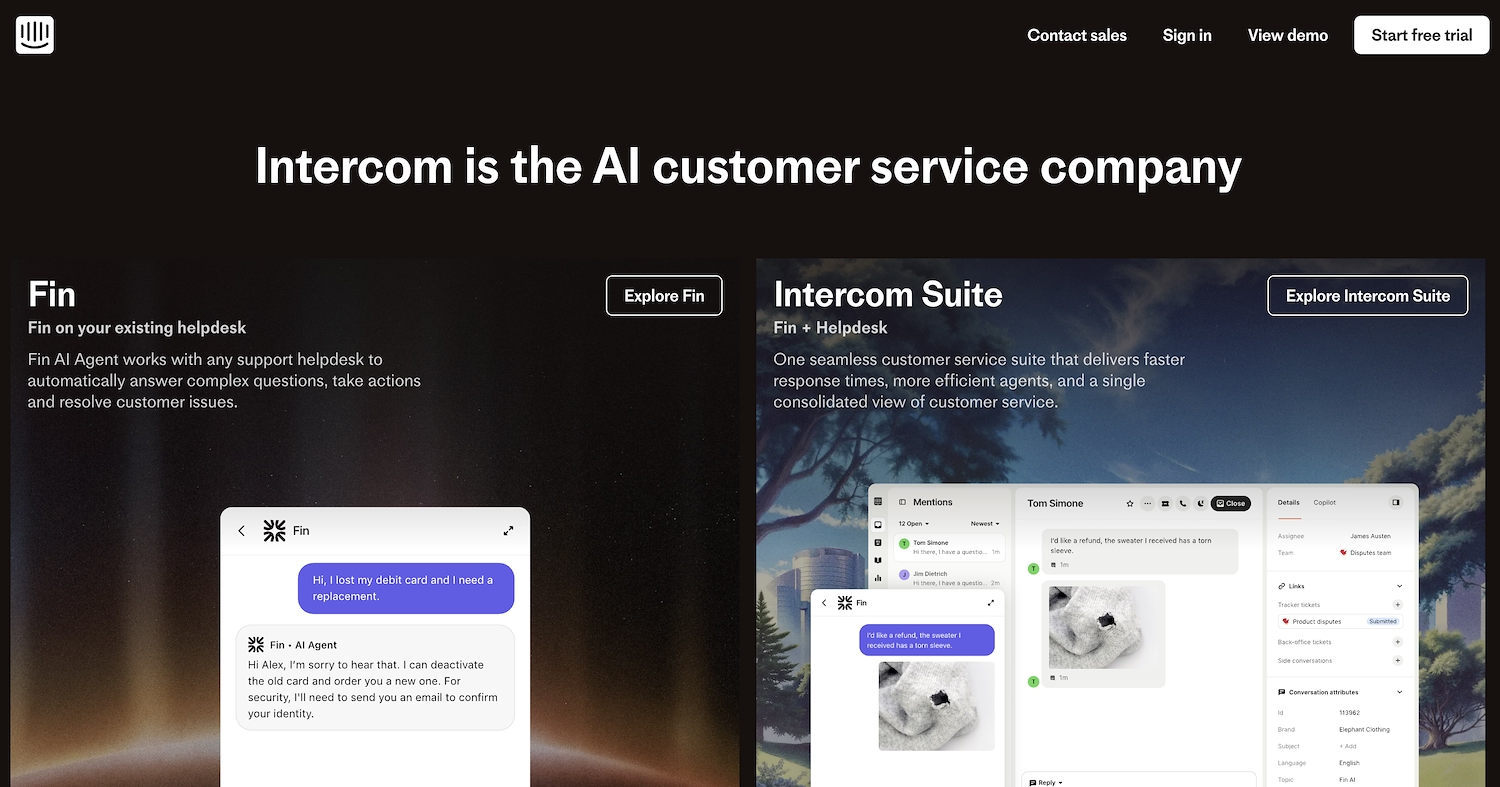
Intercom is a customer communications platform that uses AI and automation to connect with website visitors. Its main tool is a messenger that teams use for support, lead qualification, and to schedule sales meetings.
The system directs all conversations from a company's website or app into a shared inbox. This provides a central place for sales and support teams to manage customer communication.
Intercom's Main Features
- Its Fin AI agent works with any support helpdesk to answer questions and resolve issues automatically.
- The agent takes actions on behalf of support staff to complete tasks.
- The Intercom Suite combines the AI agent with a helpdesk into one product for a consolidated view of service operations.
How Intercom Compares To Chili Piper
Average Review score: 4.5/5 stars based on 3,490 G2 reviews.
- Intercom serves as a broad communication platform for both sales and customer support. This is different from Chili Piper, which focuses specifically on scheduling and lead routing for sales teams.
- The tool uses an AI agent to hold conversations with visitors across a website, email, and SMS. In comparison, Chili Piper's process begins after a visitor submits a web form.
- Its AI agent can take direct actions like processing refunds or verifying customer identity. Chili Piper does not have this function, as its main purpose is to book meetings.
- This platform provides a shared inbox that unifies all customer conversations in one place. Chili Piper integrates with external CRMs but does not offer its own centralized communication inbox.
Where Intercom Falls Short Compared To Chili Piper
- Intercom books meetings through a chat conversation. This process can introduce extra steps compared to Chili Piper, which allows leads to book a meeting instantly from a calendar after they submit a form.
- The tool's lead routing is primarily driven by chat interactions. Some users find it lacks the complex, rule-based routing of Chili Piper, which assigns leads based on specific form data like territory or company size.
- As a broad customer communication platform, its scheduling features can be less specialized. Teams that need only advanced inbound scheduling might find Chili Piper's focused toolset offers deeper customization for that specific task.
Pricing and Cost-Effectiveness
Intercom's pricing starts at $29 per seat per month with its helpdesk, or a usage-based model of $0.99 per resolution. In contrast, Chili Piper's modular plans begin at $15 per user for basic scheduling and go up to $30 for advanced routing, making it more cost-effective for focused scheduling needs.
5) LeanData
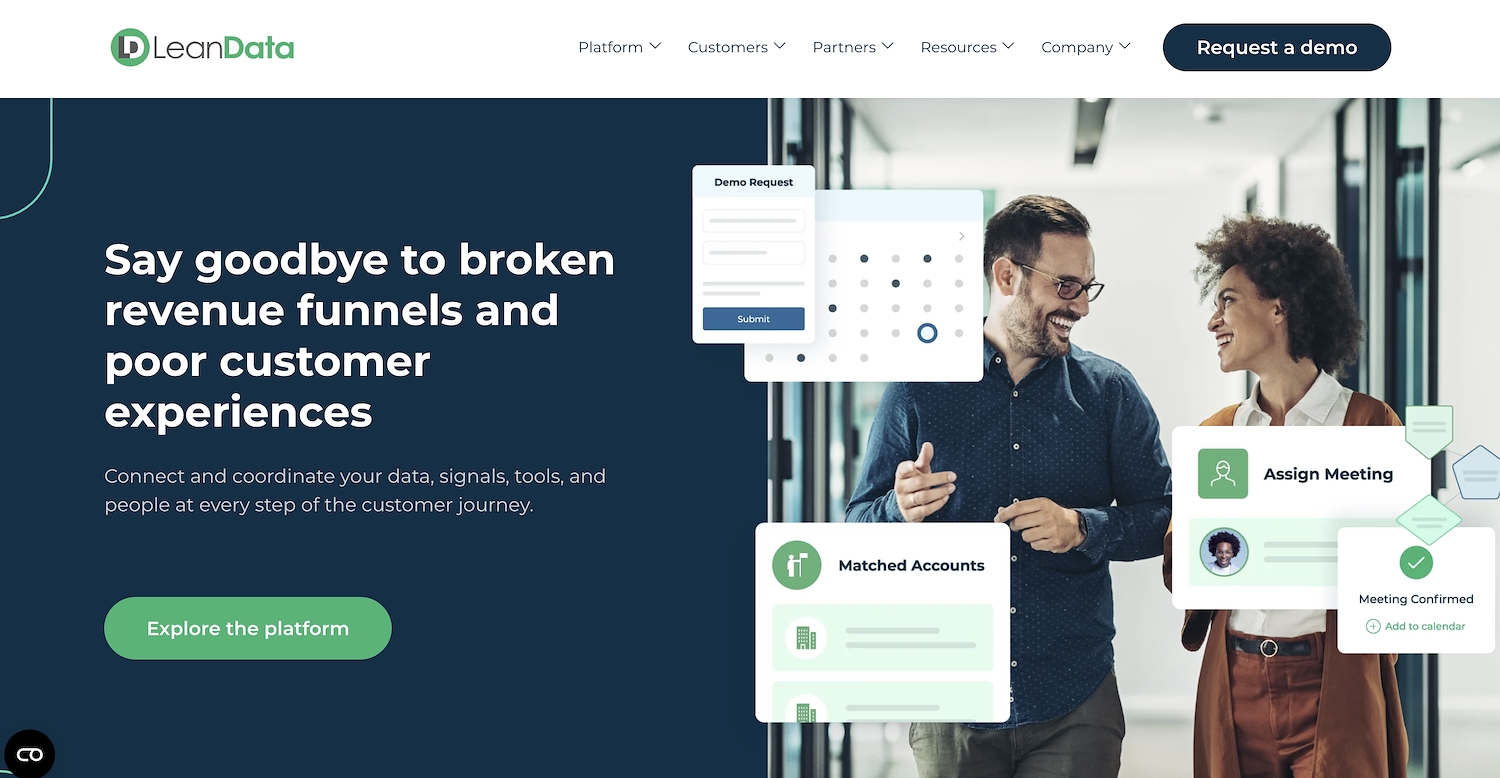
LeanData is a revenue orchestration platform for go-to-market automation. It connects customer data from different systems to manage sales and marketing processes. The software matches inbound leads with existing accounts and routes them to the correct owner.
A schedule tool lets prospects book meetings directly. This function supports account-based plays and can help create faster sales cycles.
LeanData's Main Features
- The platform provides end-to-end revenue orchestration with a visual, no-code builder for process automation.
- It performs intelligent lead-to-account matching to connect inbound leads with the correct existing accounts.
- A buying groups management feature analyzes historical win-loss data to identify and track multiple stakeholders in a deal.
- The software includes an automated scheduling tool that qualifies and books meetings from web forms or chat with round-robin assignment.
How LeanData Compares To Chili Piper
Average Review score: 4.6/5 stars based on 952 G2 reviews.
- LeanData offers advanced lead-to-account matching to connect inbound leads with existing accounts in a CRM. Chili Piper, in comparison, routes leads based on form data without this native matching function.
- The platform includes a visual, no-code builder to create complex routing workflows. This provides a different user experience than Chili Piper, which uses a series of menus and rules for its setup.
- It operates as a revenue orchestration platform that manages broader sales and marketing processes. This scope is wider than Chili Piper, which is a specialized tool for appointment scheduling and lead routing.
- The software provides detailed audit logs for tracking routing decisions. This feature gives more visibility into the lead journey than Chili Piper's system, which centers on the final meeting assignment.
Where LeanData Falls Short Compared To Chili Piper
- LeanData's setup can be complex due to its broad revenue orchestration features. Some users report a steep learning curve, which is different from Chili Piper's more focused and often simpler interface for appointment scheduling.
- Its scheduling tool is part of a larger system. This sometimes results in a less immediate booking experience compared to Chili Piper, which specializes in presenting a calendar the instant a lead submits a form.
- As a broad revenue orchestration platform, its features can feel less specialized for teams that only need an inbound scheduling tool. Chili Piper provides a more dedicated solution for that specific part of the sales process.
Pricing and Cost-Effectiveness
Chili Piper offers modular plans that start at $15 per user per month for basic scheduling and $30 for advanced routing. LeanData does not publish its pricing, so for the most accurate information, it is best to visit LeanData's official website.
Consider 11x for Sales Automation
For teams that need to automate sales work beyond appointment tools, digital workers are a practical option. They manage tasks from lead outreach to CRM updates, which lets your sales team focus on deals.
If this approach fits your strategy, see how our digital workers support your GTM team. You can book a demo to learn more about the 11x platform.
With 11x, we run your sales playbook with AI. Alice finds accounts and manages outreach, while Julian qualifies leads and schedules meetings. Our platform unifies data enrichment, outreach, and email warmup, which replaces multiple tools in your GTM stack.
See how it works when you book a demo.
6) Kronologic
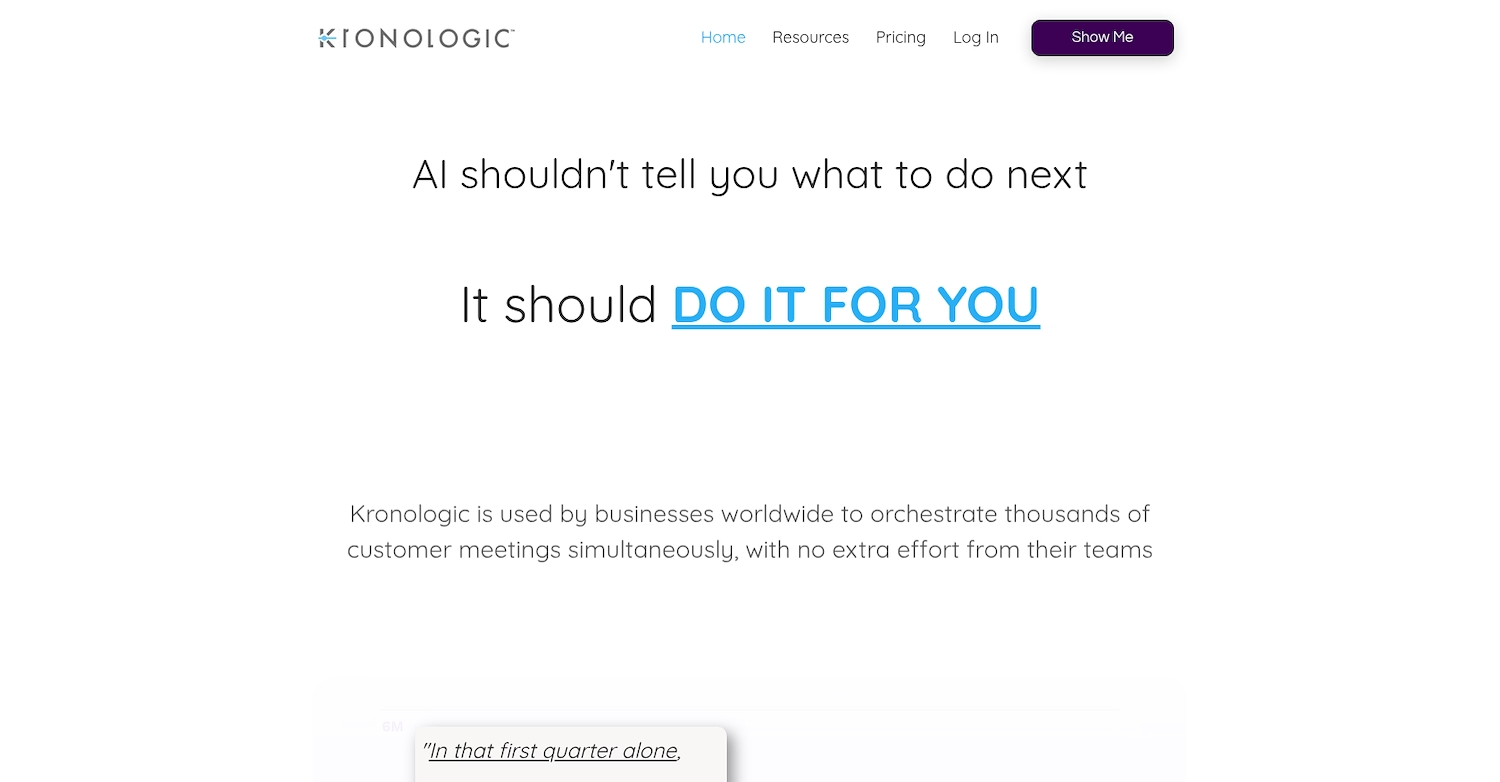
Kronologic is a calendar automation platform. It proposes meeting times to leads for a sales team and manages appointment logistics. The tool places booked meetings on a representative's calendar, which removes manual coordination to secure a time slot with a prospect.
Kronologic's Main Features
- The platform uses an AI engine to propose times, negotiate changes, and book meetings on calendars.
- It operates at three scales for one-to-one, one-to-many, and many-to-many meeting coordination.
- The tool generates human-like emails automatically for scheduling outreach.
- It manages reminders and reschedules without requiring intervention from a representative.
How Kronologic Compares To Chili Piper
Average Review score: 4.2/5 stars based on 270 G2 reviews.
- Kronologic sends calendar invites directly to qualified leads through email. This is different from Chili Piper, which requires a lead to first submit a web form to access a calendar.
- The platform uses an AI agent to negotiate meeting times and manage reschedules automatically. In comparison, Chili Piper presents a rep's fixed availability for the lead to choose from.
- It includes a feature that uses generative AI to create initial outreach messages. Chili Piper does not have a comparable function, as its workflow begins after a lead makes contact.
- This tool can operate on a performance-based model where payment is tied to accepted meetings. This contrasts with Chili Piper's subscription model, which charges a monthly fee per user.
Where Kronologic Falls Short
- Kronologic does not offer an instant booking option directly from a web form. This is different from Chili Piper, which shows a calendar immediately after a lead submits their information to capture high-intent prospects.
- The tool's lead routing is less complex. Chili Piper provides advanced, rule-based distribution based on form data like territory or account ownership, which some sales teams require for their workflows.
- It relies on an AI agent to propose meeting times via email. Some prospects might prefer the direct control of selecting a time from a calendar, which is the primary method Chili Piper uses.
Pricing and Cost-Effectiveness
Chili Piper has a subscription model starting at $15 per user monthly. Kronologic offers a performance-based model where payment is tied to accepted meetings, but does not list public rates. For exact pricing, visit Kronologic's official website.
7) Doodle
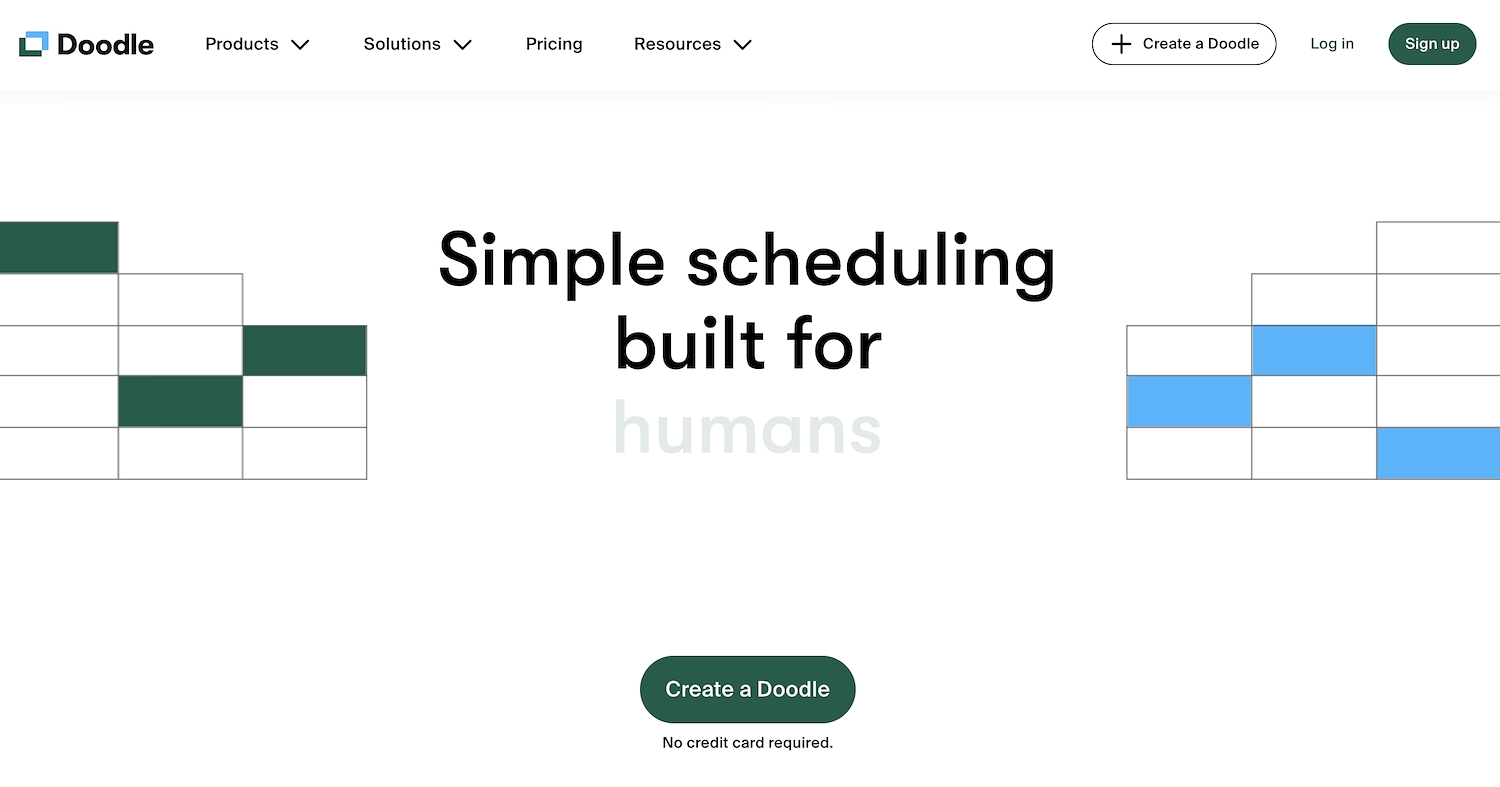
Doodle is a calendar tool that finds a common time for group events. An organizer creates a poll with potential time slots, and participants mark their availability. This approach removes the need for extended email exchanges to coordinate schedules.
It is used for professional appointments like client meetings and interviews, and for personal plans with multiple attendees.
Doodle's Main Features
- Polls invitees to find the best meeting time for a group.
- Offers a sign-up sheet for people to claim slots for events like workshops or webinars.
- Collects payments at the time of booking through a Stripe integration.
- Creates a booking page with a shareable link to accept appointments continuously.
How Doodle Compares To Chili Piper
Average Review score: 4.4/5 stars based on 2,064 G2 reviews.
- Doodle uses group polls to find a common meeting time for multiple people. This is different from Chili Piper, which focuses on one-to-one booking from a sales representative's calendar.
- The tool is designed for general-purpose scheduling across various roles, including HR and education. In comparison, Chili Piper is a specialized tool built for sales and marketing lead conversion.
- It includes a Stripe integration to collect payments when someone books a meeting, a feature Chili Piper does not offer.
- This platform provides a free plan for basic scheduling. This makes it accessible for individuals, while Chili Piper operates only on paid subscription plans.
Where Doodle Falls Short Compared To Chili Piper
- Doodle does not offer advanced lead routing. This is different from Chili Piper, which assigns leads to sales reps using rules based on form data like territory or company size.
- It lacks an instant scheduler for web forms. This means it may not capture high-intent leads as effectively as Chili Piper, which presents a calendar the moment a visitor submits their information.
- The tool is not specialized for sales workflows. Some users might find it does not support complex meeting handoffs between different sales roles, a process that Chili Piper is designed to manage.
Pricing and Cost-Effectiveness
Doodle provides a free plan, with paid options starting at $6.95 per user per year. Chili Piper has no free tier, and its plans begin at $15 per user per month. This makes Doodle a more cost-effective choice for general scheduling, while Chili Piper's higher price is for its specialized sales tools.
8) OnceHub (ScheduleOnce)
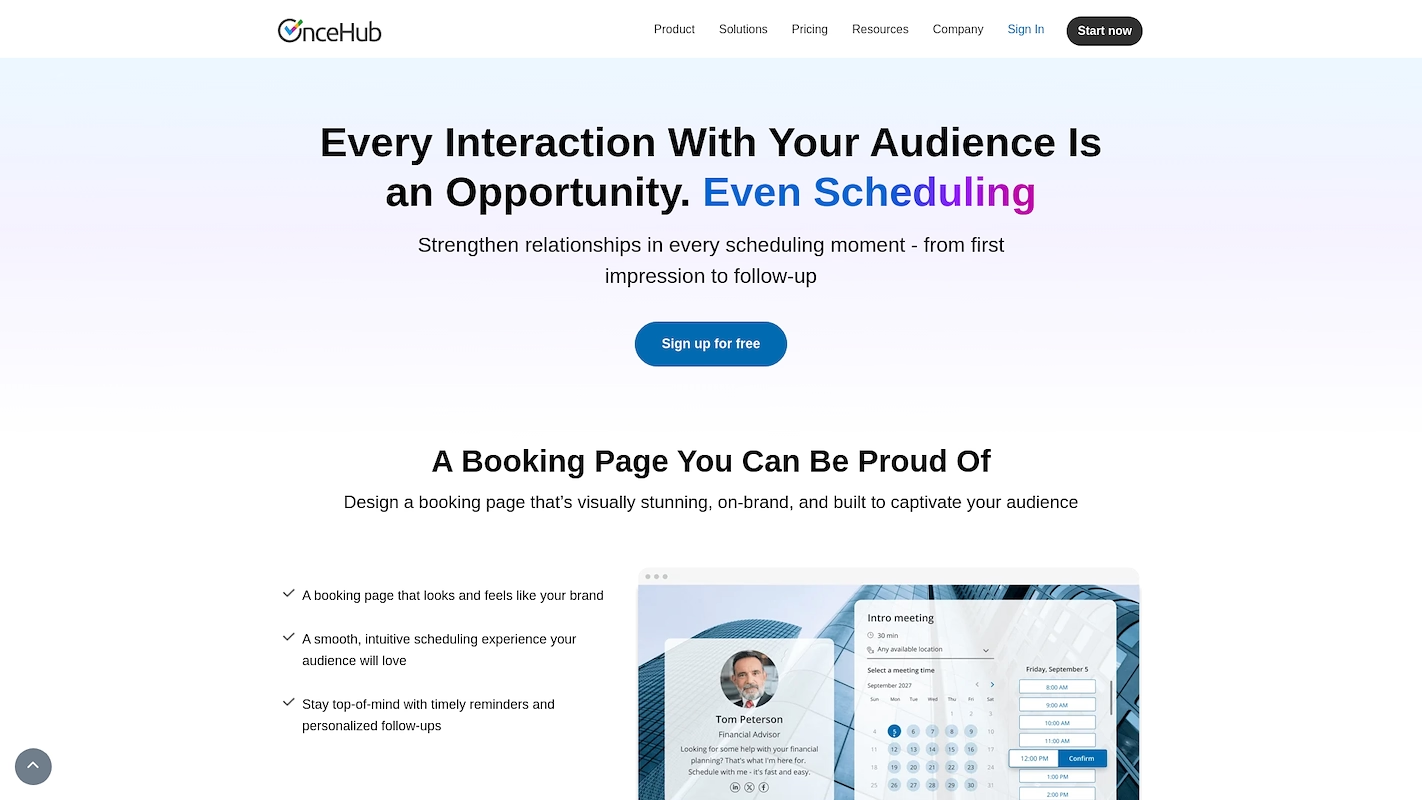
OnceHub (ScheduleOnce) is a platform for appointment automation. It provides tools like pages to book appointments, web forms, and chatbots to connect businesses with prospects. The system helps schedule sales demos, customer setup sessions, and support calls.
Its main function is to shorten the sales cycle with a direct appointment process. This helps qualify leads and route them to the correct team members.
OnceHub (ScheduleOnce)'s Main Features
- Screens and weights opportunities to automatically route them to the correct personnel.
- Manages resource pools for team collaboration and reserves rooms or equipment.
- Includes an online form builder and chatbots to capture and qualify leads.
How OnceHub Compares To Chili Piper
Average Review score: 4.3/5 stars based on 52 G2 reviews.
- OnceHub provides a free starter plan that supports up to three users. This offers an accessible option for small teams, while Chili Piper requires a paid subscription for all its plans.
- The platform includes tools to manage physical resources, such as reserving rooms or equipment for meetings. This is a feature not present in Chili Piper, which focuses only on representative availability.
- It has a native online form builder and a chatbot to capture leads. This creates a more integrated system compared to Chili Piper, which connects with third-party forms.
- This tool supports a wider range of business needs, including service delivery and general team scheduling. In comparison, Chili Piper is highly specialized for sales and marketing workflows.
Where OnceHub Falls Short Compared To Chili Piper
- OnceHub's booking process can introduce more steps compared to Chili Piper. The platform does not always provide the same instant calendar display after a form submission, which can create a slight delay for high-intent leads.
- The tool's lead routing is less advanced than Chili Piper's system. It lacks the same level of complex, rule-based distribution that uses specific form data like territory or company size to assign representatives.
- As a general scheduling platform, its features can feel less specialized for sales teams. For instance, some users find it does not manage complex meeting handoffs between different sales roles as smoothly as Chili Piper.
Pricing and Cost-Effectiveness
OnceHub offers a free plan for up to three users and a paid Growth plan at $10 per user monthly. Chili Piper has no free option, and its plans start at $15 per user per month. This makes OnceHub more cost-effective for basic scheduling, while Chili Piper's higher cost covers its specialized sales routing tools.
9) Outreach
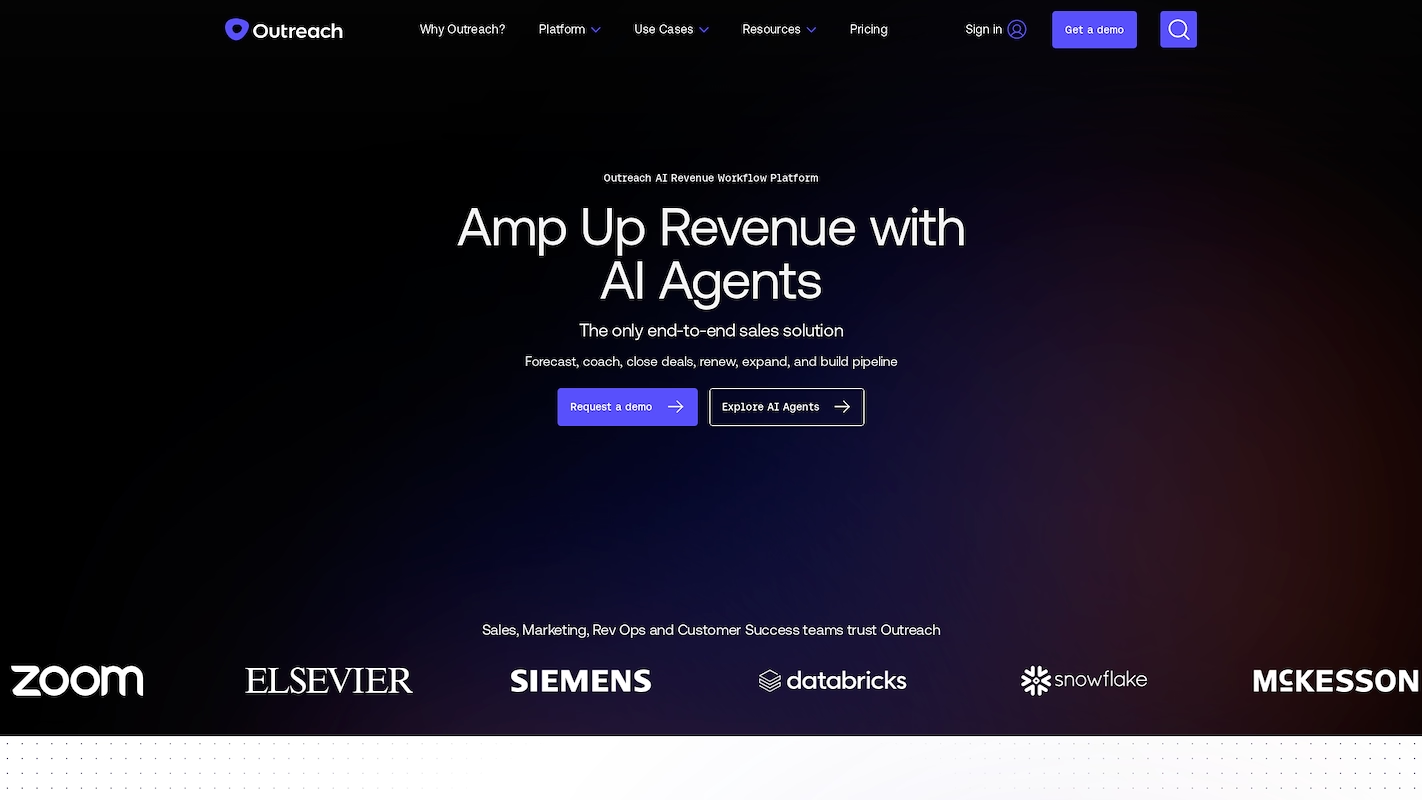
Outreach is a sales execution platform for customer engagement. It provides tools to automate sales sequences across channels like email and phone. The system includes a meeting scheduler for appointments with prospects.
It also offers analytics that track team performance and guide sales strategy. The platform connects sales activities in one place for revenue teams.
Outreach's Main Features
- The platform provides tools for sales communication, including click-to-call functionality and automated emails.
- It records prospect data and notes, which allows for the personalization of communications.
- The system offers analytics that track engagement metrics like email open rates and link activity.
How Outreach Compares To Chili Piper
Average Review score: 4.3/5 stars based on 3,479 G2 reviews.
- Outreach is a complete sales execution platform with tools for the entire sales cycle. This is different from Chili Piper, which focuses only on appointment scheduling and lead routing.
- The tool automates sales outreach across email and phone channels. In comparison, Chili Piper's process begins after a lead submits a web form and does not include outbound communication tools.
- It offers detailed analytics on sales activities, such as email open rates and link clicks. Chili Piper provides metrics that center on meeting booking and lead distribution.
- This platform includes native communication tools like click-to-call and automated email sequences. Chili Piper requires other tools for these functions, as it is built for scheduling.
Where Outreach Falls Short Compared To Chili Piper
- Outreach does not offer an instant scheduler for web forms. This is different from Chili Piper, which shows a calendar immediately after a form submission to capture high-intent leads without delay.
- Its lead routing is less advanced than Chili Piper's system. Some users find it lacks the complex, rule-based distribution that uses specific form data like territory or company size to assign representatives.
- The tool is a broad sales execution platform, so its scheduling features can be less specialized. For teams that only need advanced inbound scheduling, Chili Piper's focused toolset sometimes offers deeper customization.
Pricing and Cost-Effectiveness
Chili Piper offers modular plans starting at $15 per user per month for basic scheduling and $30 for advanced routing. Outreach does not publish its pricing, so for the most accurate information, it is best to visit Outreach's official website.
10) RevenueHero
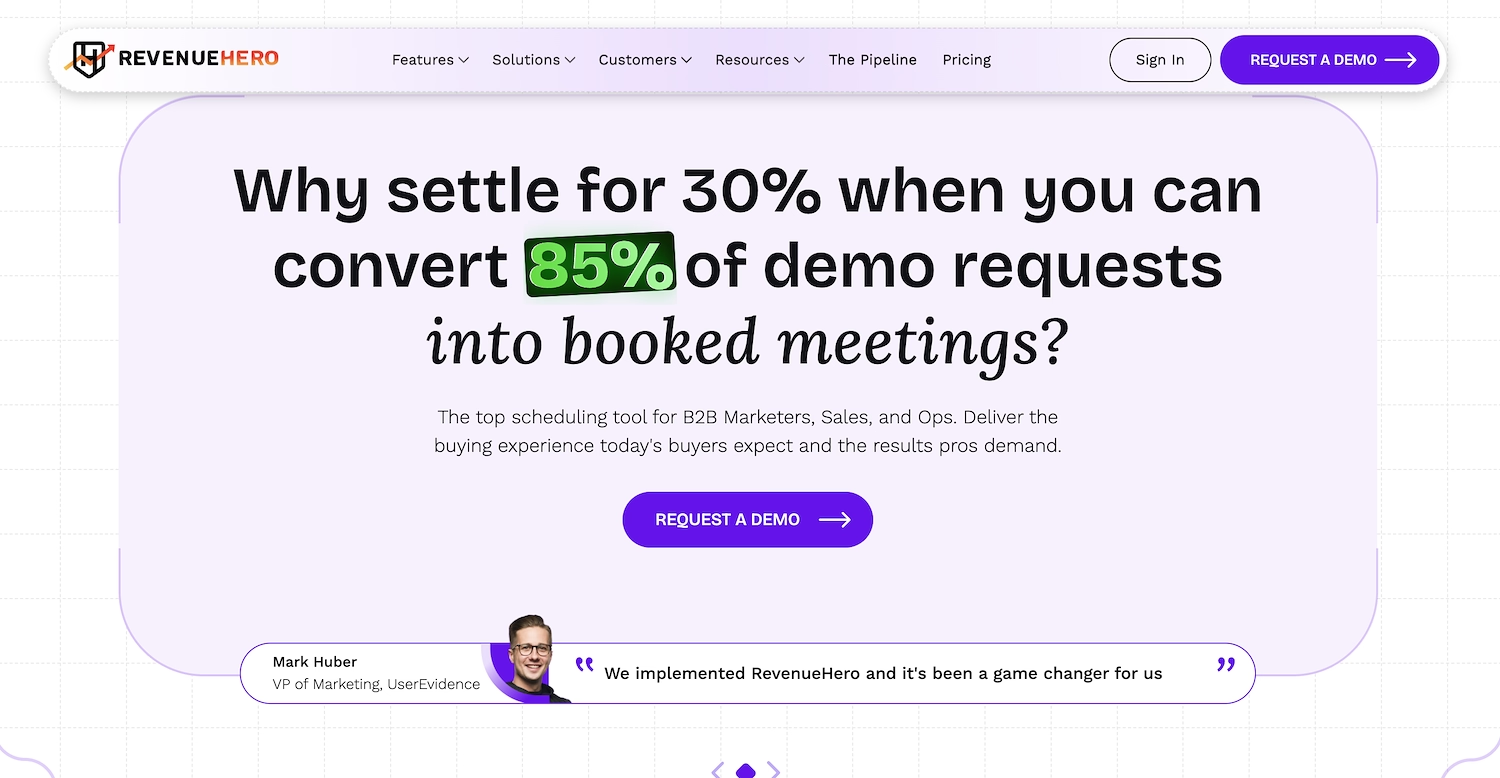
RevenueHero is a platform for inbound lead conversion. It qualifies and routes prospects from a company's web form to the correct sales representative. The system lets buyers book a meeting right after they show interest.
Its main use is for sales teams that need to manage meeting distribution and inbound lead qualification from their website.
RevenueHero's Main Features
- The platform provides audit logs to track routing decisions and service level agreements.
- It uses fuzzy matching and account tiebreakers to connect inbound leads to the correct accounts.
- The system routes leads based on multiple CRM objects, not just the lead or contact.
- It offers custom booking pages and personalized links for branding.
How RevenueHero Compares To Chili Piper
Average Review score: 4.8/5 stars based on 153 G2 reviews.
- RevenueHero uses fuzzy matching and account tiebreakers to connect leads to the correct accounts. This provides a more detailed matching process compared to Chili Piper, which primarily routes based on form field data.
- The platform routes leads based on multiple CRM objects, not just the lead or contact record. This is different from Chili Piper, which typically bases its routing rules on the information from a single object.
- It provides detailed audit logs to track routing decisions and service level agreements. This offers more visibility into the lead assignment process than Chili Piper's system, which focuses on the final meeting outcome.
- This tool offers custom booking pages and personalized links for more branding control. While Chili Piper allows some customization, RevenueHero provides more options to align the booking experience with a company's brand.
Where RevenueHero Falls Short Compared To Chili Piper
- Some users find that the booking interface can have layout issues. This is different from Chili Piper, which is known for a highly polished user experience for prospects.
- The tool's integration ecosystem is less mature. In comparison, Chili Piper provides a more extensive set of deep integrations built over many years specifically for the sales technology stack.
- The platform focuses broadly on inbound conversion. This means its features for very specific scenarios, like complex meeting handoffs between different sales teams, may be less specialized than those found in Chili Piper.
Pricing and Cost-Effectiveness
RevenueHero's Inbound Essentials plan is $25 per user monthly, while its Enterprise tier is $35. In comparison, Chili Piper offers modular pricing with basic scheduling at $15 and advanced routing at $30, making it a more cost-effective choice for simple needs.
Which One Should You Go With?
The right Chili Piper alternative depends on many factors specific to your business needs. This guide shared several options to help you make an informed decision based on features, pricing, and use cases.
If your team needs to automate sales work beyond scheduling, consider 11x. Our digital workers manage tasks from lead outreach to CRM updates. This lets your sales team focus on deals instead of administrative work.




